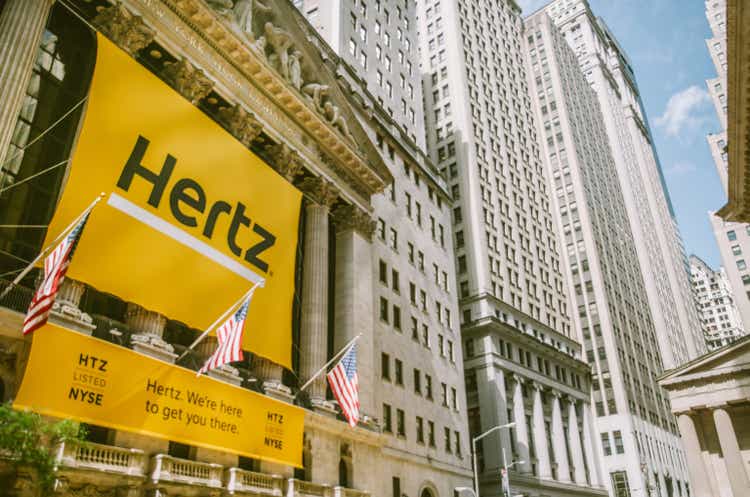
Chalffy/iStock Unreleased via Getty Images It keeps getting worse for Hertz Global Holdings ( NASDAQ: HTZ ) investors - stock price keeps dropping, unsecured debt was downgraded to CCC-, lost $300 million lawsuit, used car and truck prices keep dropping, revenue keeps dropping, debt continues to increase, and interest rates remain higher for longer than some expected. At this point, only a contrarian investor would consider buying HTZ . This is an update to my prior HTZ articles.
Data by YCharts The total return for HTZ shareholders since the company exited Ch.11 bankruptcy on June 30, 2021, has been terrible in an absolute sense and compared to Avis Budget Group (NASDAQ: CAR ). Data by YCharts Worries About a "Ch.

22" Filing I want to start with discussing the elephant in the room - bankruptcy. While many consider discussing a Ch.11 filing as being premature and even irrational, the reality is that in June Fitch downgraded their unsecured notes to CCC-, which is just a notch above a default rating.
This CCC- rating only applies to the unsecured debt. It is not the long-term issuer default rating for Hertz Corp. which is B- with a "rating watch negative".
Fitch downgraded the unsecured debt based on the "expectation that following the recently concluded secured issuances, recovery prospects for unsecured debt holders will be poor under a stress scenario, given the increased proportion of secured debt in the capital structure". This was after Hertz issued $750 million $12.625% 1lien notes and $250 million 8.
0% 2lien PIK notes in June, which both would have priority for recovery over unsecured debt in any future bankruptcy process. (See further below.) Hertz would be in a strong financial position if it did not repurchase stock, which is an issue I covered in my prior article , but I feel it is worth repeating.
They repurchased $3.430 billion worth of stock at an average price of $19.62.
These repurchases were transacted when Stephen Scherr, who was paid $182,136,137 in 2022, was still CEO. Without these repurchases, which my followers know that I am almost always against, we would be asserting how financially strong Hertz is compared to discussing a potential financial restructuring, in my opinion. Now Hertz is even restricted from making any new stock repurchases until April 1, 2025 under amendment #8 to the credit agreement, and I would not be surprised if this restriction continues longer under future amendments.
Hertz Lost Interest Rate Appeal Case Hertz shareholders in 2021 should have received a much smaller recovery under the Ch.11 reorganization plan because noteholders were underpaid according to the court decision Wells Fargo Bank, N.A.
v The Hertz Corp. (In re The Hertz Corp.), No.
23-1169 filed on September 10 ( text of the decision). The "final total will exceed $300 million" that Hertz has to pay former noteholders according to the law firm representing the noteholders. That would be close to $1 per HTZ share, which is significant considering the stock is trading at $2.
99. The appeals court ruled that the noteholders were actually entitled to their coupon interest rates, which were 5.50%-7.
125%, instead of the federal judgement rate, which was only 0.15% at that time because interest rates were so low in 2020-2021 during the bankruptcy process. These unpaid claims total about $125 million.
The court also ruled that $135 million "make whole" payments should have been allowed claims. These unpaid claims continue to accrue interest, so the total will be over $300 million. The decision was based partially on the fact that Hertz was actually solvent when it exited bankruptcy in 2021 and that the plan asserted that noteholders were "unimpaired" because their claims were fully paid.
The court ruled that in fact they were not fully paid for their entitled claims. The most interesting statement, in my opinion, in the decision was: It could be some time before Hertz has to pay, but the total will increase because interest continues to accrue. Shareholders who bought HTZ stock after Hertz exited bankruptcy are now indirectly stuck with a huge cash payment, and that "old" Hertz shareholders received a much larger recovery package than they actually should have received.
Used Vehicle Values Continue to Drop Many HTZ traders have been ignoring traditional consumer demand for car rentals, but are instead focusing mostly just on Hertz's fleet the last 2–3 years. The various issues surrounding their EV disaster I covered in my prior article, and the used car price problem keeps getting worse. The latest monthly CPI used car and truck price index is down to 178.
192 from 198.768 the year before, which is a 10.4% drop, and is down 0.
8% from the prior month. The amount of the drop over the last 12 months depends on the type of vehicle, as can be seen by the table below. EVs had the largest decline of 7.
2% based on the Manheim Index that uses a different methodology than the CPI, which also includes much older used cars/trucks, and shows a decline of 3.9& for all vehicles. site.
manheim.com The Manheim Used Vehicle Value Index is still much higher than a few years ago and has ticked up a little over the last 6 weeks. I wonder if potential sellers are holding back and are waiting for stronger prices after the Fed drops interest rates.
site.manheim.com The decline in used vehicle prices is more acute for Hertz because they purchased a large number of used vehicles near the peak of used car prices to add to their fleet, and now the market value for those used vehicles has plunged more in percentage terms than the brand-new vehicles they purchased.
The reason that the current estimated value of the fleet of vehicles is so important is that this depreciation factor is one of the metrics used to determine their lease payments to HVF, the bankruptcy remote special-purchase subsidiary that actually owns/finances the vehicles. The specific metric is depreciation per unit - DPU, and that soared to $600 in 2Q' 24 from $197 in 2Q' 23. Much of the increase was because of the decline in value for EVs.
Current management is trying to get DPU to under $325 by rotating out of old used vehicles, including EVs, into new ones, which of course takes a lot of capital. Debt Problems Keep Getting Worse Hertz is being financially squeezed by having to issue additional debt to raise needed capital and by rolling-over maturing debt at much higher interest rates for debt that was issued a few years ago when interest rates were very low. Non-vehicle debt increased to $4.
595 billion at the end of 2Q' 24 from $3.449 billion at the end of last year. In June, they sold $750 million secured 12.
625% 7/15/29 notes. That is a very high rate for first lien debt. They also sold $250 million 8% PIK 2lien notes.
In order to issue this new secured debt, their credit agreement needed to be amended to allow for 5x "consolidated first lien leverage ratio". That ratio drops to 4.75x at the end 4Q' 24 and continues to drop to 3.
0x in 4Q' 25. I have doubt they can be compliant with this covenant because they would have to significantly increase "consolidated EBITDA" since it is unlikely they will be able to reduce 1lien debt and I don't expect a dramatic improvement in their results in the near-term. (Consolidated EBITDA is defined in the agreement and is not the same as the "adjusted EBITDA" reported in quarterly/annual reports.
) If it is not met, another amendment might be needed. There is also a more restrictive $500 million liquidity requirement for 4Q' 24 and 1Q' 25, but that most likely should not be a problem. Their vehicle debt faces $2.
0 billion debt maturities from HVF III Series 2021-1. The reporting of vehicle debt in their quarterly and annual reports do not list the rates for the specific debt classes for a series. The reported interest rate for this series is 1.
66%, but that is the average - not the actual rate. The actual rates for this specific series ranges from 1.21% to 3.
98% depending on the class. Class A is first in line for payments down to Class D, which has the 3.98%.
Based on the $750 million new vehicle debt issued in two series on July 26, I am estimating that the increased annual interest expense to roll-over this $2.0 billion Series 21-1 debt could be about $85 million to $90 million, unless there is a major interest rate drop in the near future. That increase is about $0.
29 per HTZ share. The interest range on these two 2024 Series is from 5.44% to 9.
41%, which is significantly higher than the maturing 2021-1 Series. Hertz has some debt with variable interest rates that could positively impact future interest expenses if the Federal Reserve starts to lower rates, but there are also a number of debt maturities in the future that most likely will have to be rolled-over at higher rates. HTZ Valuation Given the income statement below with very large losses, it is difficult, if not impossible, to estimate an appropriate value for HTZ based on income.
The HTZ liquidation value is close to zero because most of their assets are in the remote special purpose entity that owns their vehicles, and it is unclear if the actual liquidation value of those vehicles is greater than the debt. The assets at the Hertz level are mostly intangibles, and I doubt they are worth more than the $4.6 billion non-vehicle debt.
2Q and Six Months Income Statement 2024 and 2023 ir.hertz.com Conclusion The discussion of a potential future Hertz bankruptcy is fueled by the fact that the company filed for bankruptcy in the past.
While I seriously doubt there will be a 'Ch.22" filing within the next 18 months, Hertz is in serious financial trouble, as evidenced by Fitch's CCC- rating for their unsecured debt. While bankruptcy might be unlikely, I would not be surprised if they tried some out-of-court debt restructuring using some type of equity for debt exchange offer, which would dilute current HTZ shareholders.
While the near-term outlook for Hertz is not bright, they do have well-known brands in the viable car rental industry and used vehicle prices could improve in the future if interest rates drop significantly. Therefore, since there is some long-term potential, I am keeping my "hold" recommendation for HTZ stock. Analyst’s Disclosure: I/we have no stock, option or similar derivative position in any of the companies mentioned, and no plans to initiate any such positions within the next 72 hours.
I wrote this article myself, and it expresses my own opinions. I am not receiving compensation for it (other than from Seeking Alpha). I have no business relationship with any company whose stock is mentioned in this article.
Seeking Alpha's Disclosure: Past performance is no guarantee of future results. No recommendation or advice is being given as to whether any investment is suitable for a particular investor. Any views or opinions expressed above may not reflect those of Seeking Alpha as a whole.
Seeking Alpha is not a licensed securities dealer, broker or US investment adviser or investment bank. Our analysts are third party authors that include both professional investors and individual investors who may not be licensed or certified by any institute or regulatory body..














